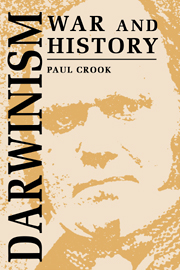 Darwinism, War and History
Darwinism, War and History Book contents
- Frontmatter
- Contents
- Acknowledgements
- Introduction
- 1 The Darwinian legacy
- 2 The age of Spencer and Huxley
- 3 Crisis in the west: the pre-war generation and the new biology
- 4 ‘The natural decline of warfare’: anti-war evolutionism prior to 1914
- 5 The First World War: man the fighting animal
- 6 The survival of peace biology
- 7 Naturalistic fallacies and noble ends
- 8 Conclusion
- Appendix: Social Darwinism
- Notes
- Bibliography
- Index
5 - The First World War: man the fighting animal
Published online by Cambridge University Press: 31 August 2009
- Frontmatter
- Contents
- Acknowledgements
- Introduction
- 1 The Darwinian legacy
- 2 The age of Spencer and Huxley
- 3 Crisis in the west: the pre-war generation and the new biology
- 4 ‘The natural decline of warfare’: anti-war evolutionism prior to 1914
- 5 The First World War: man the fighting animal
- 6 The survival of peace biology
- 7 Naturalistic fallacies and noble ends
- 8 Conclusion
- Appendix: Social Darwinism
- Notes
- Bibliography
- Index
Summary
Instinct theory andHomo pugnax
The holocaust of 1914–18 did not transform the debate over the biology of war, but it lent terrible new meaning to the dry formulations of the antebellum years and gave theories of human violence a new lease of life. As the Oxford pragmatist F. C. S. Schiller later remarked, the war ‘revealed all too clearly how ferociously unchanged beneath the thin veneer of civilization lurked the old bête humaine, and how illusory was the belief in moral progress’. The bestiality of events lent new intensity to the mythology of the Beast Within, which was now encoded anew in biological terms.
Wartime theories in a range of disciplines presented man as a ‘fighting anima’ whose primal instincts were tragically at odds with advanced culture, thus anticipating Freudian analysis and E. O. Wilson's present-day sociobiology. Instinct theory – which stemmed from animal psychology, physiology and the genetics revolution – encouraged the belief that pugnacity had been programmed into the ancient part of the human brain as a result of evolutionary pressures dating from prehistory. War was seen to be instinct-driven. Endemic violence and genocidal fighting were postulated as eugenic forces in early human evolution. ‘Fighting animal’ theory was closely associated with ‘flawed humanity’ theory that pointed the way to Arthur Koestler's concept of ‘schizophysiology’ and Paul McLean's ‘triune brain’. War was explained in distinctly modern sociobiological terms as adaptive behaviour springing from territorial urges, crowding, competition for resources and reproductive advantage, ethnocentrism and pseudo-speciation.
- Type
- Chapter
- Information
- Darwinism, War and HistoryThe Debate over the Biology of War from the 'Origin of Species' to the First World War, pp. 130 - 152Publisher: Cambridge University PressPrint publication year: 1994


